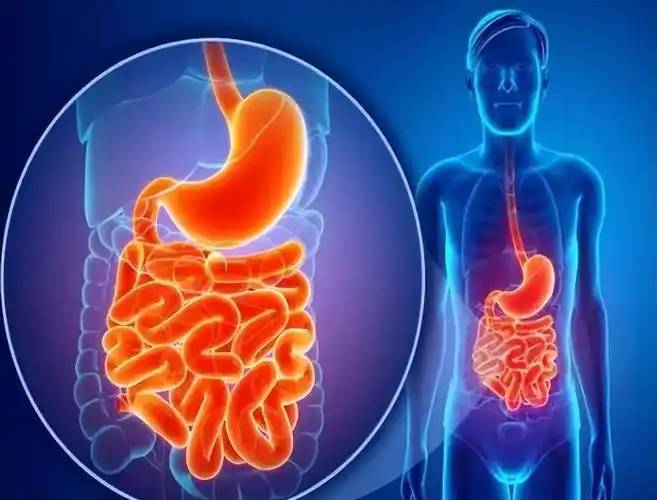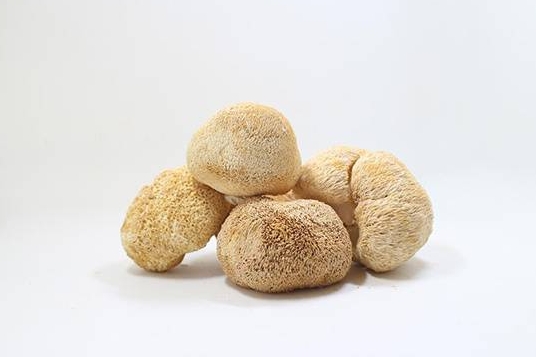Lion’s mane extract has many significant benefits for the digestive system:
1. Enhancing digestive function
Promoting secretion of digestive enzymes
Lion’s mane extract can stimulate gastric mucosal cells and prompt gastric glands to secrete more gastric juice, which includes important digestive enzymes such as pepsin. Pepsin can break down food proteins into smaller peptide segments and amino acids in an acidic environment, thereby promoting protein digestion. For example, in in vitro cell experiments, after Lion’s mane extract acts on gastric mucosal cells, it is observed that the expression level of pepsinogen significantly increases, which means that more active pepsin can be produced in the body to help digestion.
It can also stimulate the pancreas to secrete pancreatic juice, which contains various digestive enzymes such as trypsin, amylase, and lipase. Trypsin can further break down proteins, amylase can break down starch, and lipase is helpful for fat digestion. This promoting effect on digestive enzyme secretion can make food decompose more fully and efficiently in the gastrointestinal tract, thereby improving the digestive efficiency of the entire digestive system.
Improving gastrointestinal motility
Lion’s mane extract has a regulatory effect on gastrointestinal smooth muscles. For constipation problems caused by insufficient gastrointestinal motility and slow peristalsis, the active ingredients in the extract can stimulate the contraction of gastrointestinal smooth muscles and enhance the strength and frequency of gastrointestinal peristalsis. Just like injecting power into the “muscles” of the gastrointestinal tract, it promotes food residues to pass through the intestine faster and reduces the time food stays in the intestine, thereby preventing and alleviating constipation.
At the same time, for diarrhea caused by excessive gastrointestinal peristalsis, Lion’s mane extract can play an inhibitory role. It can regulate the gastrointestinal nervous system, make the contraction of gastrointestinal smooth muscles tend to be normal, restore the normal rhythm of gastrointestinal peristalsis, and help control diarrhea symptoms.
2. Protecting gastrointestinal mucosa
Forming a physical barrier
Some components in Lion’s mane extract, such as polysaccharides, can form a protective film on the surface of gastrointestinal mucosa. This film is like a natural “protective shield” that can effectively block the direct erosion of irritating substances such as gastric acid, bile, alcohol, and drugs on the gastrointestinal mucosa. For example, in an experiment simulating an acidic environment, the gastric mucosal tissue covered with the protective film of Hericium erinaceus extract is significantly less damaged by gastric acid, and its integrity is better protected.
This physical barrier effect can also prevent harmful microorganisms such as Helicobacter pylori from adhering and colonizing on the surface of the gastrointestinal mucosa. Helicobacter pylori is one of the important factors leading to various gastric diseases such as gastritis and gastric ulcers. By preventing its adhesion, Lion’s mane extract helps reduce the risk of Helicobacter pylori infection and maintain the health of gastrointestinal mucosa.
Promoting mucosal repair
Lion’s mane extract contains rich nutritional components such as amino acids, trace elements, and bioactive polysaccharides, which can provide necessary nutrients for the repair of gastrointestinal mucosa. After the gastrointestinal mucosal cells are damaged, they need sufficient nutrition for regeneration and repair. For example, glutamine is an important energy source for the metabolism of gastrointestinal mucosal cells and can promote the proliferation and differentiation of damaged mucosal cells and accelerate the mucosal repair process.
It can also stimulate mucosal cells to secrete some growth factors such as epidermal growth factor (EGF). These growth factors play a key role in the mucosal repair process and can promote cell migration and tissue reconstruction so that the damaged gastrointestinal mucosa can return to normal function faster.
3. Regulating the balance of intestinal flora
 Proliferating beneficial bacteria
Proliferating beneficial bacteria
Lion’s mane extract is a high-quality prebiotic that can provide nutrients for beneficial bacteria in the intestine, such as Bifidobacterium and Lactobacillus acidophilus. These beneficial bacteria can ferment polysaccharides and other components in Lion’s mane extract to produce short-chain fatty acids such as acetic acid, propionic acid, and butyric acid. Short-chain fatty acids can not only provide energy for intestinal mucosal cells but also reduce the pH value in the intestine and create an acidic environment unfavorable for the growth of harmful bacteria.
As beneficial bacteria are nourished by Lion’s mane extract and proliferate in large numbers, they can form a stable microbial community in the intestine and enhance the biological barrier function of the intestine. For example, Bifidobacterium can inhibit the growth and reproduction of harmful bacteria such as Escherichia coli and Salmonella by secreting antibacterial substances and competing for nutrients with harmful bacteria, thereby maintaining the balance of intestinal flora.
Inhibiting the growth of harmful bacteria
Some components in Lion’s mane extract have antibacterial activity and can directly inhibit the growth of harmful bacteria. For example, some studies have found that Lion’s mane extract has an inhibitory effect on common harmful bacteria such as Staphylococcus aureus and Candida albicans. This inhibitory effect can reduce the production of toxins by harmful bacteria in the intestine and reduce the risk of intestinal infection and inflammation.
When the balance of intestinal flora is maintained, the intestinal immune system will also be strengthened. Because there is a close interaction between intestinal flora and intestinal immune cells, the increase of beneficial bacteria and the decrease of harmful bacteria help regulate intestinal immune responses, prevent the intestinal immune system from overreacting to harmless substances such as allergic reactions, and also more effectively resist the invasion of pathogens.

Leave A Comment